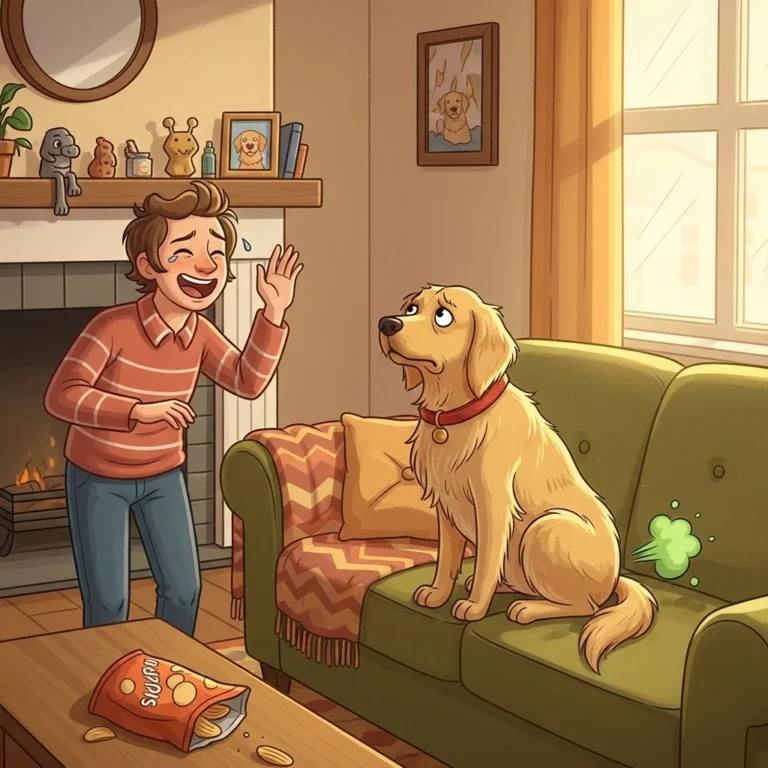
dog fart
do dogs fart? Let’s be honest — no one wants to talk about a dog fart, but if you live with a dog, you’ve definitely experienced one (or fifty). And while those surprise stink bombs can be funny at first, constant gassiness can actually tell you something about your pup’s health. So yeah, it’s worth digging into what’s going on behind the… scents.
The Stinky Truth: “Dog fart” as a Signing Post
When we talk about a dog fart, we’re not just laughing at a smell — we’re talking about what your dog’s body is trying to tell you. Farts can reveal a lot about digestion, diet, and even gut health. Once you know what’s normal and what’s not, you’ll be ready to handle the stink (and maybe prevent it altogether).
Why does my dog fart?
The Science of Flatulence in Dogs
So, what’s actually going on in there? Basically, gas builds up in your dog’s belly and needs a way out — either through burping or, well, the other end. Sometimes they swallow air, and other times it’s created when bacteria break down food in their gut. (source)
Most of the time, the gas itself doesn’t smell. It’s those tiny amounts of sulfur-based compounds that make you regret sitting next to them. (source)
The Role of the Gut Microbiome and Bacterial Fermentation
Your dog’s gut is like a mini ecosystem — billions of bacteria working hard to digest food. When they get too much fiber or carbs they can’t process, things start fermenting, and that’s when the “music” starts. (source)
Some research even shows probiotics can help calm the chaos down there and cut back on those surprise toots. (source)
How often is it normal for a dog to pass gas?
Baseline Frequencies in Healthy Dogs
Here’s the truth — there’s no magic number. A few toots a day? Totally fine. Some dogs might pass gas often; others hardly ever do. It really depends on what they eat, how fast they eat, and how their tummy works. (source)
When Frequency Tips into Concern
If your dog suddenly starts farting like a tiny fog machine — or the smell could clear a room — that’s your cue to take notice. Especially if it comes with vomiting, diarrhea, or loss of appetite. Those are red flags worth checking with your vet. (source)
Which foods and feeding habits cause the most gas in dogs — and how should I change diet safely?
Common Gas-Inducing Ingredients (legumes, soy, fiber)
If your dog’s diet includes beans, peas, soy, or lots of fiber — congratulations, you’ve got a fart factory. (source)
Soybean meal, in particular, is a big culprit according to a study by Beynen. (source)
And yep — dairy can do it too. Most dogs can’t digest lactose properly, so even a “harmless” cheese treat might trigger an epic dog fart. (source)
Transitioning Diets Gently: Best Practices
When changing food, go slow. Seriously, slow. Mix a little new food with the old stuff for at least a week or two. (source)
If you switch everything overnight, your dog’s gut bacteria won’t have time to adjust, and the result? Let’s just say you’ll be reaching for air freshener.
Can food allergies, intolerances, or medications cause excessive flatulence?
Allergy vs Intolerance: Gut Reaction Profiles
Yep, food allergies and intolerances can totally mess with digestion. Allergies are immune reactions (usually to proteins like beef or chicken), while intolerances are more about what your dog’s stomach can’t process. Both can make your pup gassy, bloated, or uncomfortable.
Medications and Supplemental Interactions
Antibiotics, dewormers, and even certain supplements can throw your dog’s gut balance off. When those good bacteria get wiped out, gas is often the side effect. Always check with your vet before giving anything new — some “miracle” digestive supplements can actually make things worse.
Are certain breeds, ages (puppies vs adults vs seniors), or hormonal changes (spay/neuter) more prone to gas?
Breed Predispositions: Brachycephalic and Others
Some breeds are just born to be gassy — sorry, Bulldog parents. Short-nosed dogs like Boxers, Pugs, and Frenchies swallow more air while breathing and eating. (source)
German Shepherds are another breed known for sensitive tummies, which often equals more frequent dog farts.
Age, Hormones, and Digestive Efficiency
Puppies’ digestive systems are still learning the ropes, so a little gas here and there is normal.
Older dogs, on the other hand, can lose some digestive enzymes — meaning food sits longer and ferments more. Hormone changes after spaying or neutering don’t cause gas directly, but metabolism shifts can make digestion slower.
Can swallowing air (aerophagia), dental or swallowing problems increase gassiness?
Aerophagia: When Dogs Gulp Too Much Air
If your dog eats like they’re in a race, they’re probably swallowing a lot of air. That air has to escape one way or another. (source)
Even constant barking can make dogs gulp air — some vets even suggest calming aids or training to help. (source)
Dental or Esophageal Causes of Trapped Gas
Bad teeth? That can lead to poor chewing — and more swallowed air. Dental pain or throat problems can also slow food passage, letting gas build up inside before it finally… escapes.
Do probiotics, digestive enzymes or microbiome tests help identify or reduce gas?
Evidence Behind Probiotics & Digestive Enzymes
Probiotics are basically “good bacteria” that help balance out your dog’s gut. Some strains, like Lactobacillus acidophilus, have been shown to improve digestion and reduce tummy troubles. (source)
Another study using Bifidobacterium animalis helped dogs under stress avoid digestive issues. (source)
Just don’t go overboard — too much of a good thing can still lead to more gas, at least temporarily. (source)
Microbiome Tests: Utility, Limitations, and Insights
Some vets use stool-based microbiome tests to see what’s going on inside your dog’s gut. (source)
They’re cool for spotting imbalances, but they’re not 100% definitive yet. Think of them as a helpful clue — not the final answer.
How can I reduce my dog’s gas and the smell at home (practical tips, exercise, feeding tools)?
Feeding Tools & Meal Strategies
Try a slow-feed or puzzle bowl so your pup can’t inhale their dinner. (source)
Feed smaller meals more often, and keep feeding time calm and stress-free. (source)
Exercise, Massage, Environmental Tweaks
Take your dog for a walk 20–30 minutes after eating — it helps food move and prevents bloating. (source)
Gentle belly rubs can also help release trapped gas (and hey, they’ll love the extra attention). (source)
Keep trash and table scraps off-limits, and crack a window if all else fails!
Are over-the-counter remedies safe and effective (simethicone, activated charcoal, herbal options)?
Common OTC Options and Their Mechanisms
- Simethicone helps break up gas bubbles so your dog can release them easier.
- Activated charcoal can absorb gas and toxins — sometimes used in vet clinics.
- Herbal aids like ginger or chamomile may help digestion, but evidence in dogs is still limited.
Safety Considerations, Vet Guidance
Always check with your vet before giving any human meds. Dosage and safety matter a lot here. What works for people can be risky for dogs, especially long term.
Do raw diets or homemade diets affect gas differently than commercial diets?
Raw & Homemade: Pros, Cons, and Gas Impacts
Raw and homemade diets can reduce gas in some dogs since they skip the processed fillers. But if the recipe’s unbalanced — too many beans or weird protein mixes — it can do the opposite.
Bottom line: less kibble dust, more fresh stuff can be good, but only if it’s nutritionally complete.
Balancing Digestibility with Nutrient Completeness
Always team up with a vet nutritionist when cooking for your pup. They’ll make sure the diet’s healthy and fart-friendly.
How long after implementing changes (diet, probiotics, slow feeder, exercise) should I expect improvement?
Typical Timeframes for Noticeable Change
Give it a week or two to see small changes, and about a month for bigger improvements. Your dog’s gut needs time to adapt, especially after a diet switch or probiotic start. (source)
Monitoring Progress and Adjusting
Track things like how often your dog farts, the smell, and what they’re eating. If things don’t get better in 6–8 weeks, check with your vet to make sure something else isn’t going on.
What medical conditions cause excessive flatulence (parasites, IBD, EPI, blockage) and when is gas a sign of a serious emergency like bloat (GDV)?
Digestive Disorders That Present with Gas
Sometimes, too much gas points to something deeper:
- Parasites like Giardia can cause gas and diarrhea.
- IBD (inflammatory bowel disease) leads to chronic tummy trouble.
- EPI (exocrine pancreatic insufficiency) messes with digestion and causes stinky, frequent dog farts.
- Blockages or tumors can trap gas — that’s when it becomes serious.
Recognizing Bloat / GDV as an Emergency
Bloat (or GDV) is no joke — it’s an emergency. (source)
If your dog’s belly suddenly balloons, they’re drooling, retching, or seem in pain, go straight to the vet. Minutes matter here.
When should I take my dog to the vet for gas, and what diagnostic tests might the vet run?
Red-Flag Symptoms Urging Veterinary Visit
Time to call the vet if your dog’s gas comes with:
- Vomiting or diarrhea
- Weight loss or appetite changes
- Blood in stool
- Pain or bloating
- Sudden change in fart frequency or smell
Diagnostic Tools: Fecal, Bloodwork, Imaging, Biopsy
Your vet might run a few tests:
- Fecal exam to check for parasites (source)
- Bloodwork to look for enzyme issues like EPI (source)
- X-rays or ultrasound for obstructions (source)
- Endoscopy or biopsy if IBD is suspected (source)
- Microbiome tests for gut health clues
How do I track and document my dog’s gas to show the vet (what details matter)?
What to Log: Frequency, Smell, Timing, Associated Symptoms
Keep a mini “fart diary” (yes, really). Write down when it happens, what they ate, and how bad it smelled. Add any stomach noises, burps, or weird poops.
Sample Log Formats & Best Practices
A simple chart works wonders:
| Date | Time | Meal Before | Smell | Stool | Vomit? | Notes |
|---|
Bring it to the vet — they’ll love you for being so organized.
Are dog farts harmful to humans (pathogens, health concerns)?
Risks: Are They More Than Just Nuisance?
Good news — your dog’s farts might offend your nose, but they won’t hurt your health. It’s mostly harmless gases like methane and CO₂.
That said, if your dog’s carrying intestinal bugs (like Giardia), that’s a different story — but that spreads through poop, not air.
Mitigations and Hygiene Practices
Open some windows, clean up fast after poop breaks, and wash your hands often. A little hygiene goes a long way — and hey, your house will smell fresher too.
Final Thoughts
Look, every dog fart tells a story. Sometimes it’s just bad timing, sometimes it’s your pup’s diet begging for a change. Start simple: better food, slower eating, more walks. If things don’t improve, call your vet. With a few tweaks and a bit of patience, you’ll breathe easier — literally.
please leave comment
you may like it






